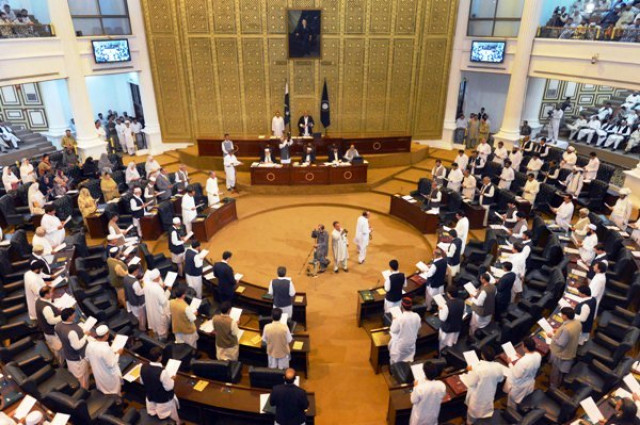With professional help: K-P seeks greater control on investing funds
Draft bill to amend GP fund act being vetted by Law ministry

Khyber-Pakhtunkhwa Assembly in session. PHOTO: AFP
The Finance Department has already prepared a draft for amending the K-P General Provident Investment Fund Act 1999, and to wrest control of the funds from banks and give it to an investment cell which will be established under the draft bill.
The bill has been sent to the K-P law department for vetting, after which it will be presented before the cabinet for approval.
The Khyber-Pakhtunkhwa (K-P) government has four funds including the General Provident Investment Fund, the Hydel Development Fund, Pension Fund and the Retirement Benefits and Death Compensation Fund.
According to officials dealing with the matter, the power to invest monies in these funds currently lies with the banks defined in the K-P General Provident Investment Fund Act 1999.
However, the draft bill will see this power given to the investment cell.
The amendment will also set the provision for creating the investment body or cell. The draft stipulates that it will be a corporate body with its own staff.
The draft also proposes an amendment to the section-6 of the act, which defines rules for the audit and accounts of the fund.
Under the proposed amendments, all withdrawals will need to be signed off by members of the investment cell’s board. Under the existing law, the chief secretary chairs the board of the fund and the secretary finance can allow withdrawals by signing off on it.
It also proposes to amend section 4 of the Act which defines the control and management of the fund.
Currently, the law stipulates that the fund shall operate under a board and the money of the fund shall be kept in a bank. Moreover, it will be invested as per the determination of this board.
This bank was defined as any financial institution in whose custody and control the fund is kept and invested.
The proposed amendments, though, seek to take the fund from the bank instead to be kept with the government under control of the board.
It seems the government had been working on the plan for a while since the K-P government recruited a professional fund manager last year on a hefty monthly pay cheque to explore investment opportunities which promise good returns. These included investments in the stock market.
“We are reviving our fund's management cell and we are diversifying the act,” said an official close to the matter, explaining, “Our laws were made by common people and these changes are made by professionals to brace them with the changing circumstances.”
"Initially we are going for short-term investments and after some time we will go for long-term investments to turn a good profit," the official disclosed.
At the moment, the fund is being invested in T-Bills, Pakistan Investment Bonds (PIBs) and Fixed Deposits.
But officials believe that the margin of profit is not good enough to compete with prevailing inflation.
“We have to take risk as per the principles of investments if we want to get good returns [on the investment] but the current circumstances do not permit us for going for long-term investments due to the risks associated with it," said a senior official close to the developments, adding that the finance department has only been cleared for short-term investments by the chief secretary due to fear of public reaction in the event of committing public to long-term investments.
“At the moment we are just managing cash. We need to take risks to beat inflation and we also have to beat the risks,” the official said as he conceded that the current interest rate of mere six per cent was prohibitively low to opt for long-term investments.
“We will invest the fund for three to six months at the moment and in future, if the interest rates rise, then we will go for long-term investments.”
Published in The Express Tribune, March 9th, 2018.













COMMENTS
Comments are moderated and generally will be posted if they are on-topic and not abusive.
For more information, please see our Comments FAQ